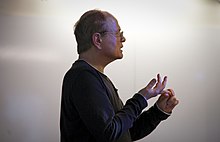Eric von Hippel
| Eric von Hippel | |
|---|---|
 |
|
| Born | August 27, 1941 |
| Fields | Management, Innovation |
| Institutions | Massachusetts Institute of Technology |
| Alma mater |
Harvard MIT Carnegie Mellon |
| Doctoral advisor |
Dwight Bauman Charles Kriebel Milton Shaw Edward B. Roberts |
| Doctoral students |
Dietmar Harhoff Stefan Thomke Karim Lakhani Sonali Shah Susumu Ogawa Benjamin Mako Hill |
| Known for |
User innovation Lead user theory |
Eric von Hippel (born August 27, 1941) is an American economist and a professor at the MIT Sloan School of Management, specializing in the nature and economics of distributed and open innovation. He is best known for his work in developing the concept of user innovation – that end-users, rather than manufacturers, are responsible for a large amount of innovation. In order to describe this phenomenon, in 1986 he introduced the term lead user. Hippel's work has applications in business strategy and free/open source software (FOSS), and he is one of the most highly cited social scientists writing on FOSS.
Eric von Hippel is the son of the material scientist and physicist Arthur Robert von Hippel, who was also a professor at MIT. His great uncle is the German ophthalmologist Eugen von Hippel.
The BUGvonHippel, named for Eric von Hippel and bearing his name in Braille, is a breakout board module and an example of open-source hardware.
Hippel is a member of the Advisory Board of Patient Innovation (https://patient-innovation.com), a nonprofit, international, multilingual, free venue for patients and caregivers of any disease to share their innovations.
Eric von Hippel grew up in suburban Weston, MA with his parents, three brothers, and one sister. In his early years, Eric attended public school within the town, but then moved on to the Cambridge School of Weston – a private progressive school – for 8th grade, as well as his later years. Even as a young child, outside of the classroom, one of Eric's favorite pastimes was to try to create and invent new things. Much of his inspiration came from his father, Arthur Robert von Hippel, who was also a professor at MIT.
...
Wikipedia
